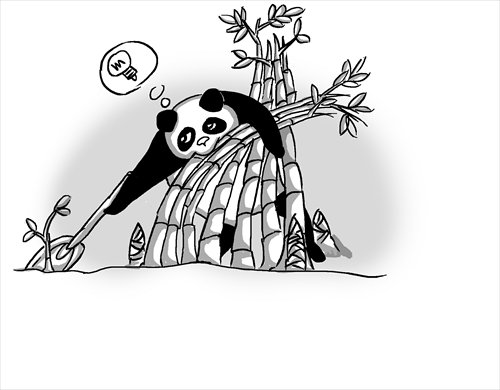Golden age of SOEs draws to close amid reforms

Illustration: Lu Ting/GT
The past year hasn't been kind to China's State-owned enterprises (SOEs).
The government's protracted crackdown on corruption spread to the country's leading SOEs in 2013 with a series of probes into executives at several of China's largest and most profitable companies; including China Mobile, China Grain Reserves Corporation, as well as oil and gas giants PetroChina Company Limited and China National Offshore Oil Corporation.
A spat of industrial accidents hasn't exactly helped the stars of the State sector either. The latest such disaster came last month in the port city of Qingdao, Shandong Province, where the explosion of a pipeline owned by China Petroleum & Chemical Corporation resulted in 55 deaths, 136 injuries and nine missing persons. An investigation later pinned the cause of the blast on human error.
Looking ahead, the future holds little more than the promise of new challenges and uncertainties. Based on official statements made since November's third plenary session, the central government is clearly determined to press ahead with further market reforms designed to turn SOEs into truly competitive commercial entities.
SOE titans have long monopolized the majority of China's key industrial sectors. With easy access to credit and few non-State competitors to challenge them in lucrative markets, these enterprises have enjoyed decades of remarkable financial success despite their management inefficiencies and indifference to the market. With industrial and financial policies skewed so heavily in their favor, it's not hard to see how SOEs have managed to eclipse the country's nascent private sector.
Much to the delight of many in the public, the glory days of SOEs are now swiftly fading into history. But for all the resentment harbored against them, people should not forget the vital part these enterprises have played in the development of China's economy. By the same token, we should not take for granted the invaluable services SOEs continue to provide for hundreds of millions of individuals.
China's SOEs are responsible for operating essential public utilities like water and electricity. They manage the country's expansive telecommunications networks as well. Rail and aviation transportation also fall under the purview of SOEs. This short list will hopefully serve as a reminder of the enormous burdens SOEs are required to shoulder at the behest of the government. Indeed, for all essential public services which the government can't directly cover, SOEs are there to pick up the slack.
This arrangement isn't unique to China. In many developed countries, SOEs also act as supporting arms for the government. That being said, we can't afford to keep turning a blind eye to the long-standing problems at China's SOEs. Inefficiency, overcapacity, overinvestment, overstaffing and outdated management structures - these are all issues that China's leaders will have to address as they move to make SOEs more market-oriented.
But for the sake of all parties involved, the reforms that lay ahead for the State sector should not be applied as punishments for SOE shortcomings. Past prejudices should be set aside and the focus now should be on crafting policies that can improve the profitability and managerial prowess of these enterprises.
In order to realize this goal, there are several steps that planners should consider. First, authorities should think about distancing themselves from the management of SOEs. They should gravitate away from directly managing these enterprises and concentrate instead on enforcing regulations and protecting the rights of market participants. If SOEs are ever to stop thinking of themselves merely as State organs, the government needs to let them run like other full-fledged commercial outfits.
Policies and incentives which encourage SOE consolidation should also be considered in order to give the private sector more space to develop. Of course, sensitive sectors related to national security should still remain largely in the hands of SOEs.
Finally, policymakers should renew their focus on creating a transparent and fair market for all enterprises. As authorities allow private capital to enter more fields, they need to foster a level playing field where well-managed companies can succeed regardless of their ownership structure.
The author is a senior analyst with Beijing-based private strategic think tank Anbound. bizopinion@globaltimes.com.cn